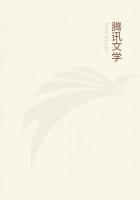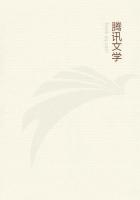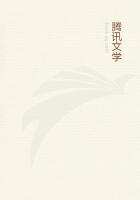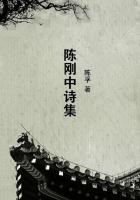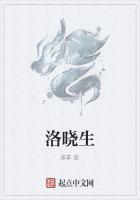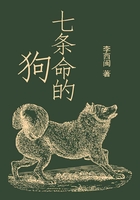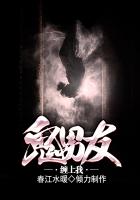In the more barren places with only occasional spears of grass in the plain another species of rodent lives, called imouran, about the size of a squirrel. They have a coat the same color as the prairie and, running about it like snakes, they collect the seeds that are blown across by the wind and carry them down into their diminutive homes. The imouran has a truly faithful friend, the yellow lark of the prairie with a brown back and head. When he sees the imouran running across the plain, he settles on his back, flaps his wings in balance and rides well this swiftly galloping mount, who gaily flourishes his long shaggy tail. The lark during his ride skilfully and quickly catches the parasites living on the body of his friend, giving evidence of his enjoyment of his work with a short agreeable song. The Mongols call the imouran "the steed of the gay lark." The lark warns the imouran of the approach of eagles and hawks with three sharp whistles the moment he sees the aerial brigand and takes refuge himself behind a stone or in a small ditch. After this signal no imouran will stick his head out of his hole until the danger is past. Thus the gay lark and his steed live in kindly neighborliness.
In other parts of Mongolia where there was very rich grass I saw another type of rodent, which I had previously come across in Urianhai. It is a gigantic black prairie rat with a short tail and lives in colonies of from one to two hundred. He is interesting and unique as the most skilful farmer among the animals in his preparation of his winter supply of fodder. During the weeks when the grass is most succulent he actually mows it down with swift jerky swings of his head, cutting about twenty or thirty stalks with his sharp long front teeth. Then he allows his grass to cure and later puts up his prepared hay in a most scientific manner.
First he makes a mound about a foot high. Through this he pushes down into the ground four slanting stakes, converging toward the middle of the pile, and binds them close over the surface of the hay with the longest strands of grass, leaving the ends protruding enough for him to add another foot to the height of the pile, when he again binds the surface with more long strands--all this to keep his winter supply of food from blowing away over the prairie. This stock he always locates right at the door of his den to avoid long winter hauls. The horses and camels are very fond of this small farmer's hay, because it is always made from the most nutritious grass. The haycocks are so strongly made that one can hardly kick them to pieces.
Almost everywhere in Mongolia I met either single pairs or whole flocks of the greyish-yellow prairie partridges, salga or "partridge swallow," so called because they have long sharp tails resembling those of swallows and because their flight also is a close copy of that of the swallow. These birds are very tame or fearless, allowing men to come within ten or fifteen paces of them;but, when they do break, they go high and fly long distances without lighting, whistling all the time quite like swallows.
Their general markings are light grey and yellow, though the males have pretty chocolate spots on the backs and wings, while their legs and feet are heavily feathered.
My opportunity to make these observations came from traveling through unfrequented regions by the urga, which, however, had its counterbalancing disadvantages. The Mongols carried me directly and swiftly toward my destination, receiving with great satisfaction the presents of Chinese dollars which I gave them.
But after having made about five thousand miles on my Cossack saddle that now lay behind me on the cart all covered with dust like common merchandise, I rebelled against being wracked and torn by the rough riding of the cart as it was swung heedlessly over stones, hillocks and ditches by the wild horses with their equally wild riders, bounding and cracking and holding together only through its tenacity of purpose in demonstrating the cosiness and attractiveness of a good Mongol equipage! All my bones began to ache. Finally I groaned at every lunge and at last I suffered a very sharp attack of ischias or sciatica in my wounded leg. At night I could neither sleep, lie down nor sit with comfort and spent the whole night pacing up and down the plain, listening to the loud snoring of the inhabitants of the yurta. At times I had to fight the two huge black dogs which attacked me. The following day I could endure the wracking only until noon and was then forced to give up and lie down. The pain was unbearable. I could not move my leg nor my back and finally fell into a high fever. We were forced to stop and rest. I swallowed all my stock of aspirin and quinine but without relief. Before me was a sleepless night about which I could not think without weakening fear. We had stopped in the yurta for guests by the side of a small monastery.
My Mongols invited the Lama doctor to visit me, who gave me two very bitter powders and assured me I should be able to continue in the morning. I soon felt a stimulated palpitation of the heart, after which the pain became even sharper. Again I spent the night without any sleep but when the sun arose the pain ceased instantly and, after an hour, I ordered them to saddle me a horse, as I was afraid to continue further in the cart.
While the Mongols were catching the horses, there came to my tent Colonel N. N. Philipoff, who told me that he denied all the accusations that he and his brother and Poletika were Bolsheviki and that Bezrodnoff allowed him to go to Van Kure to meet Baron Ungern, who was expected there. Only Philipoff did not know that his Mongol guide was armed with a bomb and that another Mongol had been sent on ahead with a letter to Baron Ungern. He did not know that Poletika and his brothers were shot at the same time in Zain Shabi. Philipoff was in a hurry and wanted to reach Van Kure that day. I left an hour after him.

